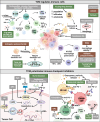Traditional Chinese medicine in lung cancer treatment
- PMID: 40001110
- PMCID: PMC11863959
- DOI: 10.1186/s12943-025-02245-6
Traditional Chinese medicine in lung cancer treatment
Abstract
Lung cancer remains a major global health challenge and one of the leading causes of cancer-related deaths worldwide. Despite significant advancements in treatment, challenges such as drug resistance, side effects, metastasis and recurrence continue to impact patient outcomes and quality of life. In response, there is growing interest in complementary and integrative approaches to cancer care. Traditional Chinese medicine (TCM), with its long history, abundant clinical experience, holistic perspective and individualized approach, has garnered increasing attention for its role in lung cancer prevention and management. This review provides a comprehensive overview of the advances in TCM for lung cancer treatment, covering its theoretical foundation, treatment principles, clinical experiences and evidence supporting its efficacy. We also provide a systematic summary of the preclinical mechanisms, through which TCM impacts lung cancer, including the induction of cell death, reversal of drug resistance, inhibition of metastasis and modulation of immune responses. Additionally, future prospects for TCM in lung cancer treatment are discussed, offering insights into its expanded application and integration with modern medicine to address this challenging disease.
Keywords: Cancer immunology; Cancer metastasis; Chinese herbal medicine; Clinical trials; Combination therapy; Drug resistance; Lung cancer; Traditional Chinese medicine.
© 2025. The Author(s).
Conflict of interest statement
Declarations. Ethics approval and consent to participate: Not applicable. Consent for publication: Not applicable. Competing interests: The authors declare no competing interests.
Figures





References
-
- Siegel RL, Giaquinto AN, Jemal A. Cancer statistics, 2024. CA Cancer J Clin. 2024;74(1):12–49. - PubMed
-
- Islami F, Marlow EC, Thomson B, McCullough ML, Rumgay H, Gapstur SM, et al. Proportion and number of cancer cases and deaths attributable to potentially modifiable risk factors in the United States, 2019. CA Cancer J Clin. 2024;74(5):405–32. - PubMed
-
- Hendriks LEL, Remon J, Faivre-Finn C, Garassino MC, Heymach JV, Kerr KM, et al. Non-small-cell lung cancer. Nat Rev Dis Primers. 2024;10(1):71. - PubMed
-
- Bensenane R, Helfre S, Cao K, Carton M, Champion L, Girard N, et al. Optimizing lung cancer radiation therapy: a systematic review of multifactorial risk assessment for radiation-induced lung toxicity. Cancer Treat Rev. 2024;124:102684. - PubMed
-
- Hirsch FR, Scagliotti GV, Mulshine JL, Kwon R, Curran WJ, Wu Y-L, et al. Lung cancer: current therapies and new targeted treatments. Lancet. 2017;389(10066):299–311. - PubMed
Publication types
MeSH terms
Substances
Grants and funding
- BX20240230/National Postdoctoral Program for Innovative Talents
- 82404919/National Natural Science Foundation of China
- GZC2023170/Postdoctoral Fellowship Program of China Postdoctoral Science Foundation
- 2024QN029/Traditional Chinese Medicine Research Project of the Shanghai Municipal Health Commission
LinkOut - more resources
Full Text Sources
Medical

